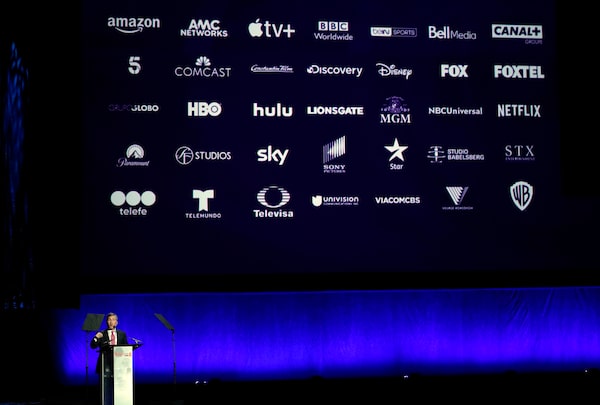It is the thick of the first true summer movie season in three years, and audiences have never had so much choice. Blockbusters (Top Gun: Maverick), superhero epics (Thor: Love and Thunder), kid flicks (Minions: The Rise of Gru), rom-coms (The Lost City): they’re all here! Oh, I don’t mean in theatres. All the titles above – and so many more – are now available online, for free, via piracy sites.

The Matrix Resurrections Canadian premiere dominates Cineplex's Scotiabank Theatre on Dec. 16, 2021 in Toronto.ERNESTO DiSTEFANO/Getty Images for Warner Bros. Pictures Canada
While some services are more user-friendly than others – old-school players like The Pirate Bay require familiarity with BitTorrent technology, while upstarts such as Bflix look and feel like slick streamers, complete with Top 10 lists and handy tags denoting which films are “HD” rips and which are “CAM” copies illicitly recorded during in-cinema screenings – they all represent a large and pervasive threat to anyone who makes and watches movies. Forget the streaming wars: piracy is the battle truly hitting Hollywood.
How much exactly is a matter of debate. As journalist Richard Rushfield’s popular industry newsletter The Ankler put it this past fall, estimates of how badly piracy costs the U.S. economy range from a low of US$29-billion to a possible US$71-billion. But piracy websites, some of which now operate as streamers themselves complete with monthly subscription packages priced to access a mind-boggling array of content, also collect reams of online advertising revenue, which Bloomberg pegs at US$1.3-billion a year.
Canada isn’t immune, either. According to the Motion Picture Association (MPA) of Canada, there were 3.8 billion visits to piracy sites by Canadians in 2020, while 12 per cent of Canadian households used subscription TV piracy services in 2020, up from nine per cent the year before.
And up until this spring, almost everyone in the industry preferred to talk about just about anything else: China, COVID-19, Netflix. But then in April, Charles Rivkin, chairman of the Washington, D.C.-based MPA, delivered something of a barn-burner speech at the annual CinemaCon confab in Las Vegas that woke up the early-morning attendees. Rivkin, whose trade group counts all the major studios and streamers as members, reminded his audience that while the fight against piracy might be a complicated one, it has “all the international intrigue and high-stakes action you’d see in any marquee movie.” And to combat such an evolving threat, the industry has to respond with an equally evolved response.
“It is the kind of topic that can be weedy and feel boring, but this is an existential threat to our industry,” Rivkin says in an interview with The Globe. “And we are now deep into this fight.”
How deep? A decade ago, the MPA tackled about two-dozen anti-piracy cases per year. Today, it’s two-dozen per week. Every day around the globe, law-enforcement officials are coordinating with one another, executing plans with codenames like Operation Krypton (in which 24,000 illicit devices were seized in Madrid) and Operation 404 (226 piracy websites and 461 piracy apps shut down in Brazil). In Canada this past March, three popular services (the Ontario-based Northern IPTV, the Quebec-based IPTVOnline24, and the Alberta-based GloryV) were shut down, their domains redirected to the MPA’s Watch Legally site.
This ramped-up fight is largely due to the creation of the MPA’s Alliance for Creativity and Entertainment (ACE) coalition, which was formed in 2017 to liaise with governments and agencies like Interpol, and today counts almost 40 entertainment companies as members, including a number of giants in the Asia-Pacific region that were added last month.
But the battle wouldn’t be so intense if piracy hadn’t so quickly evolved from the days of sidewalk DVD hawkers. Blame technology, but also consumer habits that shifted dramatically during the pandemic. We’re all now experts at navigating the digital landscape to find what we want to watch – just as we’re not so patient to wait for the buzziest productions to hit the legal home-entertainment market.
During the height of the pandemic, this promise of instant access was made a reality, such as when studio Warner Bros. made the unprecedented decision to send all of its 2021 theatrical titles to its streamer HBO Max the same day that they opened in theatres. It was a move that not only tweaked audience expectations, but also resulted in high-quality pirated copies flooding the internet almost immediately.
While Warner Bros. has since backed away from what is called its “day-and-date” model, and Rivkin is cautious to tie such a release model to any increase in piracy (“We have a research team looking into this issue, and it’s complicated”), the issue of consumer apathy is genuine. And genuinely problematic.

Charles Rivkin, chairman and CEO of the Motion Picture Association, speaks in front of a screen listing the names of entertainment companies during the 'State of the Industry' presentation at CinemaCon 2022, the official convention of the National Association of Theatre Owners at Caesars Palace in Las Vegas on April 26.Chris Pizzello/The Associated Press
It is especially tricky when you factor in myriad territorial rights issues, which further stymie international consumers. In Canada, there is a going assumption that when a series or film is released in the U.S., it should be immediately available to watch here, too. But the North American market is not a completely harmonized one, which is why all your friends are currently talking about the new FX restaurant drama series The Bear, even though it won’t be legally available in Canada on Disney+ until August.
Then there are infrequent but no less unsettling stories that pop up about the ephemeral nature of digital ownership, such as when Sony’s PlayStation Store this month pulled access to hundreds of movies purchased by customers in Germany and Austria. Even Oscar-winning filmmaker Guillermo del Toro admitted recently that he “love(s) certain pirate entities. I am sorry. There are certain films we have to go to them to see because they are not available on Blu-ray.”
Rivkin and his colleagues, though, are intent on hammering home the message that theft is theft – and such actions have consequences for both the economy and individual consumers.
“I don’t understand why if a brick-and-mortar store was robbed the rules would be different on the internet. Intellectual property is one of North America’s greatest exports,” Rivkin says, adding that users visiting piracy sites are 30 times more likely to be exposed to malicious content, such as malware, on their devices.
“There are 140 lawful online platforms for film and content in the U.S. alone, and 500 in the world. You can’t make the argument that, like in the past, we no longer have a choice but to steal it.”
In the past, this PR fight has flailed – recall the MPA’s hokey 2004 public-service announcement that played as an un-skippable preshow clip on DVDs, and which noted that “you wouldn’t steal a car, you wouldn’t steal a handbag … pirating films is stealing!” and has since become a much-mocked element of meme culture.
Today, the MPA is focused on ensuring that consumers know that real-world criminals are behind these operations – villains fit for the big screen, whose piracy is “often folded into other illegal activities like gambling, money laundering, tax evasion, drugs, grand theft auto and prostitution.” No PSAs necessary.
“We’re not talking about folks doing this because they’re idealists or activists. They’re doing it for money,” says Jan van Voorn, the MPA’s executive vice-president of global content protection and head of ACE.
But as many rogue players are operating, van Voorn and Rivkin insist that their efforts are not amounting to a game of whack-a-mole. Since ACE’s inception, there have been significant victories – updated U.S. federal legislation has made operating a piracy website a felony; a new partnership with Google has removed 10,000 illegal domains from search results – which have helped bring the number of illicit North American services down from 1,400 in 2019 to approximately 240.
“There’s no silver bullet, so we need to take all the tools we have: break anonymity, transfer domain names, work with payment processors, ad providers, domain proxies,” van Voorn says.
Crucially, piracy isn’t only affecting conglomerate-backed blockbusters. Last year, the intellectual property advocacy group Creative Future highlighted the case of Barry Jenkins’ Moonlight, the low-budget 2017 Best Picture winner that grossed US$65-million worldwide during its theatrical run – but was also pirated an estimated 60 million times during that same time period. If only five per cent of those pirated views were converted to paid digital rentals priced at the going rate of $3.99 each, then the film would’ve earned an extra $12-million – an inconsequential amount for a Marvel movie, but crucial for an indie production.
“Piracy means that people won’t be able to finance their next movie, that people will lose their jobs,” Rivkin says. “It’s not just about the large studios. It is the entire entertainment industry ecosystem.”
Plan your screen time with the weekly What to Watch newsletter. Sign up today.
 Barry Hertz
Barry Hertz